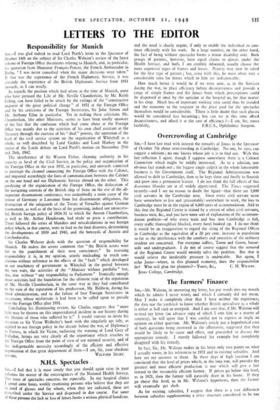LETTERS TO THE EDITOR
Responsibility for Munich
sIft,—I was glad indeed to read Lord Perth's letter in the Spectator of October 14th on the subject of Sir Charles Webster's review of the latest volume of Foreign Office documents relating to Munich, and, in particular, his quotation from Monsieur Francois-Poncet, the French Ambassador in Berlin, "I was never consulted when the major decisions were taken." If that was the experience of the French Diplomatic Service, it was certainly the experience of the British Diplomatic Service from 1931 onwards, as I can testify.
As regards the position which had arisen at the time of Munich, none who have perused the Life of Mr. Neville Chamberlain, by Mr. Keith Feiling, can have failed to be struck by the railings of the "constructive engineer of the great political change" of 1931 at the Foreign Office and by his criticisms of the Foreign Secretaries, Sir John Simon and Mr. Anthony Eden in particular. Yet in making these criticisms Mr. Chamberlain, like other Ministers, seems to have been totally unaware of the fact that the confusion which had come about at the Foreign Office was mainly due to the activities of his own chief assistant at the Treasury through the exercise of his " dual " powers, the operation of the head of the civil service system on the organisation of Whitehall as a whole, so well described by Lord Geddes and Lord Mulkey in the course of the Lords debate on Lord Perth's motion on November 25th and 26th, 1942.
The interference of Sir Warren Fisher, claiming authority in his capacity as head of the Civil Service, in the policy and organisation of the Foreign Office in the year 1931, in particular, and onwards contrived to interrupt the channel connecting the Foreign Office with the Cabinet, and impaired accordingly the lines of communication between the Cabinet on the one hand and our Diplomatic Service abroad on the other. This paralysing of the organisation of the Foreign Office, the dislocation of the navigating controls of the British ship of State on the eve of the all- important disarmament conference, was undoubtedly a main CAUSC of the release of Germany at Lausanne from her disarmament obligations, the destruction of the safeguards of the Treaty of Versailles against German rearmament, as well as of the basis of the promising, indeed not unsuccess- ful, British foreign policy of 1924-31 to which Sir Austen Chamberlain, as well as Mr. Arthur Henderson, had made so great a contribution. There followed the series of blunders and miscalculations in our foreign policy which, in due course, were to lead to the final disasters, determining the developments of 1939 and 1940, and the betrayals of Austria and Czechoslovakia.
Sir Charles Webster deals with the question of responsibility for Munich. He makes the severe comment that "the British actors were left to the punishment of their own consciences." In assessing responsibility it is, in my opinion, utterly misleading to reach con- clusions without reference to the effects of the " fault " which developed in our machinery of government in Whitehall in the period between the two wars, the activities of the "Minister without portfolio" but, alas, also without "any responsibility to Parliament." Ironically enough those activities laid the foundation for the ultimate ruin of the reputation of Mr. Neville Chamberlain, in the same way as they had contributed to the ruin of the reputation of his predecessor, Mr. Baldwin, during his third administration, and to the failure of four Foreign Secretaries in succession, whose misfortune it had been to be called upon to preside over the Foreign Office after 1931.
Concluding his illuminating review, Sir Charles suggests that "more light may be thrown on this unprecedented incident in our history during the lifetime of those who suffered by it." I would venture to invite his attention to Sir Victor Wellesley's book with the singularly apt title, as applied to our foreign policy in the decade before the war, of Diplomacy in Fetters, in which Sir Victor, endorsing the warning of Lord Grey of Fallodon, brings out very clearly all the importance which attaches to the Foreign Office from the point of view of our national security, and of the indispensable necessity accordingly of the efficient and effective (lionisation of that great department of State.—! am Sir, your obedient servant, am, SELBY.


































 Previous page
Previous page